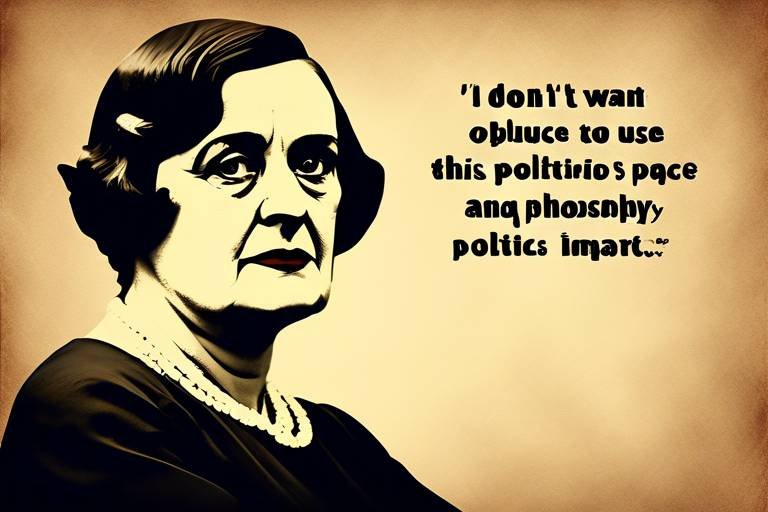Ayn Rand's Objectivism - Philosophy's Impact on Politics
Ayn Rand's Objectivism is not just a philosophical doctrine; it is a bold declaration of the power of the individual in a world often dominated by collectivist ideologies. This article explores the fundamental principles of Objectivism and its significant influence on modern political thought, particularly in the realms of individualism, capitalism, and the role of government in society. Imagine a world where your own happiness and success are not just ideals, but the very foundation of a thriving society. This is the essence of Rand's vision.
At its core, Objectivism is built on the pillars of rational self-interest and the unwavering belief in individual rights. Rand argued that each person should pursue their own happiness as their highest moral aim. This philosophy rejects the notion that self-sacrifice is virtuous, instead positing that one's own life and happiness are paramount. The implications of this thought are profound, shaping not only ethical perspectives but also political ideologies. For instance, when individuals prioritize their own rational interests, they contribute to a society that values freedom and prosperity.
In the tug-of-war between individualism and collectivism, Rand's philosophy firmly stands on the side of the individual. She believed that the rights of the individual should never be sacrificed for the sake of the collective. This perspective invites us to think critically about the implications of prioritizing personal freedom and responsibility. When individuals are empowered to make their own choices, society flourishes. However, when the collective takes precedence, personal liberties are often compromised. This tension raises important questions: What is the role of government in safeguarding individual rights? How do we balance the needs of the many with the rights of the few?
Central to Objectivism is the idea that reason is the primary means of human survival and progress. Rand championed rational thought as the bedrock for human action and political decisions. She argued that emotions and whims should not dictate our choices; instead, we must rely on our rational faculties to navigate the complexities of life. This emphasis on reason challenges us to consider how our decisions—both personal and political—are informed by logic rather than fear or coercion.
Rational self-interest is a cornerstone of Objectivism. Rand posited that when individuals pursue their own happiness, they inadvertently contribute to the well-being of society as a whole. Think of it this way: when you are thriving and fulfilled, you are more likely to engage positively with others, innovate, and contribute to your community. This creates a ripple effect, leading to a more prosperous society. Thus, the pursuit of personal happiness is not a selfish endeavor; it is a pathway to collective success.
The ethical framework of Objectivism promotes values that support individual rights and freedoms. It emphasizes virtues such as honesty, integrity, and justice, encouraging individuals to act in ways that respect the rights of others while pursuing their own goals. This ethical stance has profound implications for political ideologies, as it fosters a culture of respect for individual rights and responsibilities. As we explore political practices today, we can see how these ethics influence debates around personal freedoms and government intervention.
Rand's unwavering support for capitalism is rooted in her belief in individual rights. She argued that free markets are essential for achieving personal and societal prosperity. In her view, capitalism is not merely an economic system; it is a reflection of the moral right to trade and interact with others freely. By defending free markets, Rand challenged the notion that government intervention is necessary for economic stability. Instead, she claimed that a laissez-faire approach allows individuals to flourish, leading to innovation and wealth creation.
The political ramifications of Objectivism are profound and far-reaching. Rand's ideas challenge traditional political systems that prioritize the collective over the individual. Instead, she proposes a new vision for governance—one that respects individual rights and limits government intervention. This perspective invites us to reconsider the role of government in our lives and the extent to which it should interfere in personal choices.
In Rand's view, the government's role should be limited to protecting individual rights. This principle shapes her stance on the functions and limitations of government, arguing that any form of coercion or force against individuals is inherently wrong. The government should act as a protector, not a provider, ensuring that citizens can pursue their own happiness without interference. This radical shift in thinking prompts us to question: Should government be more involved in our lives, or should it step back and allow individuals to thrive?
Ayn Rand's Objectivism has left an indelible mark on contemporary political movements. Her ideas resonate strongly in modern political debates, particularly those surrounding individual rights and capitalism. From discussions on personal freedoms to the role of government in the economy, Rand's philosophy continues to inspire and provoke thought. As we navigate today's political landscape, her emphasis on individualism and rational self-interest remains a powerful lens through which to view our world.
- What is Objectivism? - Objectivism is a philosophical system developed by Ayn Rand that emphasizes rational self-interest and individual rights.
- How does Objectivism view capitalism? - Objectivism supports capitalism as it aligns with individual rights and promotes personal and societal prosperity.
- What is the government's role according to Objectivism? - The government’s role is to protect individual rights, with minimal intervention in personal choices and economic activities.
- How does Objectivism influence modern politics? - Rand's philosophy challenges traditional political systems and inspires contemporary debates on individual rights and the role of government.

The Essence of Objectivism
Objectivism, a philosophy crafted by Ayn Rand, stands as a bold declaration of the importance of rational self-interest and the sanctity of individual rights. At its core, Objectivism champions the idea that each person is an end in themselves, not merely a means to an end for others. This concept is revolutionary, especially in a world often dominated by collectivist ideologies that prioritize the group over the individual. Imagine a society where each person is encouraged to pursue their own happiness, free from the constraints of societal expectations. That’s the essence of Objectivism!
Rand's philosophy is built upon several fundamental principles that shape both ethical and political perspectives. First and foremost is the idea that reason is the primary tool of human survival. In Objectivism, reason is not just a faculty; it is the very foundation upon which individuals must base their actions. This means that decisions should not be swayed by emotions or societal pressures but rather grounded in rational thought and logical analysis. When individuals embrace reason, they empower themselves to make choices that align with their own best interests.
Moreover, the concept of individual rights is paramount in Objectivism. Rand posits that every human being possesses inherent rights simply by virtue of being human. These rights are not granted by society or government; they exist independently and must be respected by all. This leads to a natural conclusion: a government’s role should be to protect these rights, ensuring that individuals can pursue their own paths without interference. In this way, Objectivism provides a robust framework for understanding the relationship between the individual and the state.
In addition to reason and individual rights, Objectivism promotes the idea of rational self-interest. This principle asserts that individuals should act in ways that are in their own best interests, as long as those actions do not infringe upon the rights of others. It’s not about selfishness in the negative sense; rather, it's about recognizing that one's own happiness is a valid pursuit and that by striving for personal success, one contributes to the overall prosperity of society. This creates a symbiotic relationship between personal ambition and societal growth.
To summarize the essence of Objectivism, we can distill its core tenets into the following key points:
- Reason is the only means of acquiring knowledge.
- Individualism is paramount; each person is an end in themselves.
- Rational self-interest leads to personal and societal prosperity.
- Individual rights must be protected by a limited government.
Through these principles, Objectivism not only provides a philosophical foundation for personal and political ethics but also challenges the traditional norms that often stifle individual potential. It invites us to reconsider the role of government, the nature of morality, and the importance of personal freedom in our lives. As we delve deeper into the implications of Objectivism, we begin to see how these ideas resonate in our modern political landscape, paving the way for a society that celebrates the individual.

Individualism vs. Collectivism
When we dive into the world of political philosophy, individualism and collectivism emerge as two contrasting ideologies that shape our understanding of society and governance. Ayn Rand, the brilliant mind behind Objectivism, staunchly advocates for individualism, arguing that the rights of the individual should take precedence over the needs of the collective. But what does this really mean? In a world where we often hear the phrase "the greater good," Rand challenges us to reconsider the implications of sacrificing personal freedom for the sake of the group.
At its core, individualism celebrates the idea that each person is an independent entity with the right to pursue their own happiness. This philosophy posits that every individual possesses unique talents and aspirations that contribute to the richness of society. When individuals are free to make choices based on their personal convictions, they not only achieve personal fulfillment but also drive innovation and progress. Think about it: some of the greatest inventions and ideas in history emerged from individuals who dared to think differently and challenge the status quo.
On the flip side, collectivism emphasizes the importance of the group over the individual. It suggests that individuals should subordinate their personal desires for the benefit of the community. While this may sound noble, Rand argues that such a mindset can lead to a dangerous erosion of personal rights and freedoms. When society prioritizes the collective, it often results in the suppression of individual creativity and initiative. After all, how can a society thrive if its members are not encouraged to pursue their own dreams and ambitions?
To illustrate the difference between these two ideologies, consider the following table:
| Aspect | Individualism | Collectivism |
|---|---|---|
| Definition | Focus on individual rights and personal freedom | Emphasis on group needs and community welfare |
| Value of the Individual | Each person is unique and valuable | Individuals are part of a larger whole |
| Decision-Making | Personal choices based on rational thought | Decisions made for the benefit of the group |
| Societal Impact | Encourages innovation and progress | Can lead to conformity and suppression of dissent |
In the political arena, the clash between individualism and collectivism has profound implications. For instance, policies that prioritize individual rights, such as property rights and free speech, are often championed by individualistic ideologies. Conversely, collectivist policies may advocate for wealth redistribution and social welfare programs, arguing that these measures serve the common good. However, Rand warns that allowing the government to infringe upon individual rights in the name of collectivism can lead to tyranny.
Ultimately, the debate between individualism and collectivism forces us to ask some tough questions: Should we prioritize the needs of the many over the rights of the few? Can a society truly flourish if its members are not free to pursue their own paths? Rand's Objectivism offers a resounding answer: the flourishing of society depends on the flourishing of individuals. The more we empower individuals to act in their own rational self-interest, the more we create a thriving, prosperous community.
- What is individualism?
Individualism is a philosophy that emphasizes the moral worth of the individual, advocating for personal freedom and self-reliance. - What is collectivism?
Collectivism is a political or economic theory that prioritizes the group over individual interests, often advocating for communal ownership and shared responsibilities. - How does Ayn Rand view individualism?
Ayn Rand views individualism as essential for personal happiness and societal progress, arguing that individuals should be free to pursue their own goals without interference from the collective. - What are the dangers of collectivism?
Rand argues that collectivism can lead to the erosion of individual rights, conformity, and ultimately, tyranny, as it suppresses personal initiative and creativity.

The Role of Reason
At the heart of Ayn Rand's Objectivism lies the principle of reason. Rand believed that reason is not just a tool for survival; it is the very essence of what it means to be human. Unlike other philosophies that may prioritize faith, emotions, or collective beliefs, Objectivism champions rational thought as the primary means of understanding the world and making decisions. Imagine trying to navigate a ship without a compass—without reason, individuals drift aimlessly, vulnerable to the whims of fate. In Rand's view, reason provides the direction needed to steer our lives toward happiness and success.
Reason, according to Rand, is the faculty that allows us to perceive reality, form concepts, and make judgments. It is the basis for all human knowledge and the foundation upon which ethical and political principles are built. Without reason, how can we determine what is right or wrong? How can we engage in meaningful discourse about governance or society? This is why Rand argued that the pursuit of knowledge through reason is not merely beneficial but essential for a thriving society.
In her philosophy, Rand emphasizes that reason must be applied consistently and objectively. This means that individuals should not allow their emotions or societal pressures to cloud their judgment. Instead, they should rely on logic and evidence to make informed decisions. For instance, consider the difference between choosing a career based on personal passion versus societal expectations. When one chooses based on reasoned analysis of their skills and market demand, they are more likely to find fulfillment and success. This rational approach fosters not only personal growth but also contributes to a more productive society.
Furthermore, Rand posits that reason is crucial in political discourse. She argues that political decisions should be grounded in rational thought rather than emotional appeals or collectivist ideologies. When individuals engage in political discussions, they should prioritize facts and logical reasoning, ensuring that policies are designed to promote individual rights and freedoms. In this way, reason acts as a safeguard against tyranny and oppression, allowing citizens to critically evaluate the actions of their government.
To illustrate the significance of reason in Objectivism, consider the following table that contrasts rational thought with other forms of decision-making:
| Decision-Making Approach | Characteristics | Potential Outcomes |
|---|---|---|
| Rational Thought | Logical, evidence-based, objective | Informed decisions, personal empowerment |
| Emotional Decision-Making | Impulsive, subjective, reactionary | Regret, instability, potential harm |
| Collectivist Ideologies | Groupthink, conformity, reliance on authority | Loss of individuality, oppression, inefficiency |
In summary, the role of reason in Ayn Rand's Objectivism cannot be overstated. It is the beacon that illuminates the path toward individual rights, ethical living, and effective governance. By embracing reason, individuals not only enhance their own lives but also contribute to the advancement of society as a whole. In a world that often seems chaotic and unpredictable, reason serves as a reliable guide, empowering us to make choices that lead to a brighter future.
- What is Objectivism? Objectivism is a philosophical system developed by Ayn Rand that emphasizes rational self-interest, individualism, and capitalism.
- Why is reason important in Objectivism? Reason is the foundation of knowledge and decision-making in Objectivism, guiding individuals toward rational choices and ethical living.
- How does Objectivism view government? Objectivism advocates for a limited government whose primary role is to protect individual rights.
- What are the implications of individualism in politics? Individualism promotes personal freedom and responsibility, challenging collectivist ideologies and fostering a society based on voluntary cooperation.

Rational Self-Interest
At the heart of Ayn Rand's philosophy lies the concept of , a principle that might sound selfish at first glance, but in reality, it serves as the foundation for a thriving society. When we talk about rational self-interest, we’re not just referring to a narrow focus on personal gain; rather, it’s about making choices that are not only beneficial for oneself but also contribute positively to the world around us. Think of it as planting a garden: you nurture your own plants, but in doing so, you create a beautiful space that others can enjoy too.
Rand argues that pursuing one's happiness is not just a personal endeavor; it’s a moral imperative. The idea is that when individuals act in their own best interests, they inadvertently foster an environment where others can also thrive. This is because rational self-interest encourages people to engage in productive activities, innovate, and create value, which ultimately leads to societal progress. Imagine a marketplace where everyone is focused on their own success—this competition drives quality and innovation, benefiting consumers and society as a whole.
Moreover, rational self-interest is about making informed and thoughtful decisions. It’s not about acting on whims or short-term desires, but rather about taking a long-term view of what will genuinely enhance one’s life. For instance, investing time in education or developing a new skill may not yield immediate rewards, but these actions are aligned with rational self-interest as they lead to greater opportunities and fulfillment in the future.
To further illustrate, let’s consider the following table that outlines the differences between rational self-interest and mere self-indulgence:
| Rational Self-Interest | Self-Indulgence |
|---|---|
| Focuses on long-term benefits | Emphasizes immediate gratification |
| Encourages personal responsibility | Often leads to irresponsibility |
| Promotes productive actions | Can result in destructive behavior |
| Values the well-being of oneself and others | Prioritizes only personal pleasure |
In this light, rational self-interest can be seen as a guiding principle for ethical behavior. When individuals prioritize their own well-being while respecting the rights and needs of others, they create a harmonious society where everyone can flourish. This is the essence of Rand's vision—a world where people are free to pursue their own paths, leading to a collective advancement that benefits all. So, the next time you hear someone mention rational self-interest, remember that it’s not about being selfish; it’s about recognizing that our personal happiness is intertwined with the happiness of others.

Ethics of Objectivism
The are rooted in the belief that the pursuit of one's own happiness is not only a personal goal but also a moral imperative. Ayn Rand argues that individuals should act in accordance with their rational self-interest, which means making choices that promote their own well-being and flourishing. This perspective shifts the focus from altruism, which often demands self-sacrifice, to a more empowering view that encourages individuals to prioritize their own needs and desires.
At the heart of Objectivist ethics is the idea that each person is an end in themselves, not merely a means to an end for others. This principle emphasizes the importance of individual rights, which Rand defines as the freedom to think, act, and pursue happiness without interference from others. By recognizing that each person has their own unique values and goals, Objectivism fosters a society where individuals can coexist peacefully while pursuing their own interests.
To further understand the impact of these ethical principles, consider the following key tenets:
- Rationality: Objectivism posits that reason is the only means of knowledge and the guide to action. Individuals must think critically about their choices and the consequences they entail.
- Self-Interest: Pursuing one's own happiness is not selfish in a negative sense; rather, it is a rational approach to living a fulfilling life. This self-interest leads to productive engagement with the world around us.
- Individual Rights: The ethical framework of Objectivism places a premium on individual rights, arguing that these rights must be upheld and protected by society and government.
These principles not only shape personal conduct but also influence broader political ideologies. For instance, when individuals prioritize their own happiness and respect the rights of others, it creates a foundation for a just society where voluntary cooperation and trade can flourish. This ethical stance promotes a culture of accountability and responsibility, as individuals recognize their actions can impact others.
Moreover, Objectivism's ethical framework challenges conventional notions of morality that often emphasize sacrifice and duty to others. Instead, it invites a refreshing perspective that celebrates personal achievement and self-reliance. This shift can lead to a more vibrant and dynamic society, where innovation and creativity thrive, fueled by individuals who are motivated to pursue their passions.
In summary, the ethics of Objectivism advocate for a life guided by reason, self-interest, and respect for individual rights. By adopting these principles, individuals can contribute to a society that values personal freedom and prosperity, ultimately leading to a more harmonious and productive world.
- What is the main ethical principle of Objectivism? The main principle is that individuals should pursue their own happiness and act in their rational self-interest.
- How does Objectivism view altruism? Objectivism critiques altruism as a moral obligation that often demands self-sacrifice, proposing instead that individuals should prioritize their own values and happiness.
- Can Objectivism coexist with other ethical frameworks? While Objectivism is distinct, it can interact with other frameworks, although its core tenets may conflict with collectivist or altruistic ideologies.

Capitalism and Objectivism
At the heart of Ayn Rand's philosophy lies a profound belief in capitalism as the only social system that recognizes and respects individual rights. For Rand, capitalism isn't just an economic system; it's a manifestation of her core principles of rational self-interest and individualism. In her view, a free market is essential for human flourishing because it allows individuals to pursue their own happiness without interference from others, including the government. This is not merely an ideological stance; it is a reflection of her unwavering belief that individuals are the best judges of their own interests.
Rand argued that capitalism is the only system that aligns with the moral principles of Objectivism. She believed that when individuals are free to trade value for value, they engage in mutually beneficial exchanges that enhance their lives and contribute to societal progress. In her seminal work, Atlas Shrugged, Rand illustrates this through the character of Dagny Taggart, who embodies the virtues of innovation and determination in a capitalist society. The novel serves as a powerful testament to the idea that when individuals are free to act on their rational self-interest, society as a whole benefits.
One of the most compelling aspects of Rand's defense of capitalism is her critique of government intervention in the economy. She asserted that any form of government control, whether through regulations, taxes, or welfare programs, undermines the very principles of freedom and individual rights that capitalism upholds. This is where her philosophy diverges sharply from collectivist ideologies, which prioritize the group over the individual. In Rand's eyes, such ideologies lead to tyranny and stagnation, stifling creativity and innovation.
To illustrate the relationship between capitalism and Objectivism, consider the following table, which summarizes the key attributes of both:
| Capitalism | Objectivism |
|---|---|
| Free markets | Rational self-interest |
| Voluntary exchange | Individual rights |
| Limited government | Objective reality |
| Wealth creation | Personal happiness |
Furthermore, Rand's vision of capitalism is not just about profit; it is about creating a society where individuals are empowered to pursue their passions and achieve their goals. She believed that a capitalist society fosters innovation and creativity, as individuals are motivated to develop new ideas and solutions to problems. This dynamic environment not only benefits the individuals involved but also propels society forward, creating a cycle of growth and prosperity.
In conclusion, the relationship between capitalism and Objectivism is intricate and profound. Rand's philosophy champions a system where individual rights are paramount, and the government plays a minimal role, primarily focused on protecting those rights. By advocating for capitalism, Rand not only defended economic freedom but also laid the groundwork for a society that values human potential and achievement. This perspective remains relevant today, as contemporary debates about economic systems and individual rights continue to echo her ideas.
- What is Ayn Rand's Objectivism? - Objectivism is a philosophy that emphasizes rational self-interest and individual rights, advocating for a capitalist society where individuals are free to pursue their own happiness.
- How does Objectivism view capitalism? - Objectivism views capitalism as the only moral social system, as it allows individuals to trade value for value without coercion, fostering innovation and personal freedom.
- What are the main criticisms of Rand's philosophy? - Critics argue that Rand's emphasis on individualism can lead to a lack of social responsibility and that her views on capitalism may overlook the potential for inequality.
- How does Objectivism influence modern politics? - Rand's ideas continue to resonate in contemporary political movements that emphasize individual rights, limited government, and free-market principles.

Political Implications of Objectivism
The political ramifications of Objectivism are profound, reshaping how we think about governance and individual rights. Ayn Rand's philosophy presents a radical departure from traditional political systems, advocating for a model where the individual's rights are paramount. This is not just a theoretical ideal; it has real-world implications that challenge the status quo of governmental authority and societal norms. In a world where collectivism often reigns, Rand's ideas shine a light on the importance of personal freedom and responsibility. But what does this mean for our political landscape?
At the core of Objectivism is the belief that the role of government should be strictly limited. Rand posits that the government's primary function should be to protect individual rights, rather than to impose regulations that infringe upon personal freedoms. This leads to a political framework where laws are designed not to control, but to safeguard the liberties of the individual. Imagine a society where the government is a night watchman, ensuring that no one violates your rights while allowing you the freedom to pursue your own happiness. This is the essence of Rand's vision.
One of the most significant implications of Objectivism is its challenge to the welfare state. In Rand's view, the redistribution of wealth is not a moral imperative but a violation of individual rights. This perspective raises critical questions about the role of government in economic matters. Should the government be involved in wealth distribution, or should it focus solely on protecting property rights? The debate continues, with Objectivism advocating for a free-market economy where individuals can thrive based on their own efforts and talents.
Moreover, Objectivism encourages a political discourse centered around rational thought. In a society where emotions often drive decisions, Rand's emphasis on reason provides a refreshing approach. Political debates influenced by Objectivism would focus on logical arguments rather than emotional appeals. This shift could lead to more informed policy-making and a populace that values critical thinking over blind allegiance to political ideologies.
To further illustrate the political implications of Objectivism, consider the following table that summarizes key aspects of Rand's philosophy in contrast to traditional political thought:
| Aspect | Objectivism | Traditional Political Thought |
|---|---|---|
| Role of Government | Protector of individual rights | Provider of social welfare |
| Economic System | Capitalism | Mixed Economy |
| Ethical Foundation | Rational self-interest | Collective good |
| View on Rights | Inalienable individual rights | Conditional rights based on social needs |
As we navigate through modern political debates, it's crucial to recognize how Rand's ideas resonate today. From discussions on healthcare to debates on taxation, the principles of Objectivism challenge us to reconsider the balance between individual rights and government intervention. Her philosophy encourages us to ask: Are we prioritizing the collective at the expense of the individual? Or can we find a way to create a society where personal freedoms flourish alongside communal responsibilities?
In conclusion, the political implications of Objectivism extend far beyond mere philosophy; they serve as a call to action for individuals and policymakers alike. By embracing the principles of individualism, capitalism, and limited government, we can aspire to create a society that truly respects and protects the rights of every individual. So, as we engage in political discourse, let us keep Rand's vision in mind and strive for a future where the individual is celebrated, not sacrificed.
- What is Objectivism? - Objectivism is a philosophy developed by Ayn Rand that emphasizes rational self-interest and individual rights.
- How does Objectivism view the role of government? - Objectivism advocates for a limited government whose primary role is to protect individual rights.
- What are the ethical principles of Objectivism? - The ethical framework of Objectivism promotes values that support individual rights and rational self-interest.
- How has Objectivism influenced modern politics? - Rand's ideas have significantly impacted contemporary political movements, particularly regarding individual rights and capitalism.

Government's Role
In the realm of Objectivism, the government's role is not just a matter of policy; it's a fundamental principle that shapes the very fabric of society. Ayn Rand posited that the government should exist solely to protect individual rights. This means that its functions should be limited to a few essential areas, primarily focused on maintaining order and safeguarding freedom. Imagine a referee in a game; their job is not to play for either team but to ensure that the rules are followed. Similarly, Rand believed that the government should act as a protector of rights, not as an arbiter of moral values or economic outcomes.
This limited role of government leads to a profound understanding of the relationship between the state and the individual. The government should not interfere in the personal choices of its citizens, as long as those choices do not infringe on the rights of others. This perspective fosters an environment where individuals can thrive, innovate, and pursue their own happiness without unnecessary bureaucratic hurdles. Rand’s vision challenges the conventional notion of government as a provider of welfare and services. Instead, she argues for a system where the government is a guardian of freedom, allowing the free market to operate unimpeded.
To encapsulate Rand's views on the government's role, consider the following key points:
- Protection of Rights: The primary function of government is to protect individual rights, including life, liberty, and property.
- Non-Interference: The government should refrain from interfering in personal and economic matters.
- Rule of Law: A government based on objective laws ensures that all individuals are treated equally.
- Limited Scope: The government should focus on law enforcement, national defense, and the judicial system.
Moreover, Rand was critical of any form of collectivism that seeks to undermine individual rights in favor of the so-called "common good." She believed that when the government oversteps its boundaries, it leads to tyranny and oppression. In her view, the ideal government is one that operates under a system of capitalism, where free markets drive innovation and prosperity. This economic system, according to Rand, aligns perfectly with her philosophy, as it respects individual rights and fosters a spirit of competition and creativity.
In a world where government intervention is often seen as a solution to societal problems, Rand's philosophy serves as a refreshing reminder of the importance of personal responsibility and freedom. By advocating for a government that protects rather than controls, Objectivism encourages individuals to take charge of their own lives and destinies. The implications of this are profound: a society that values individual rights and limited government is likely to be one that is more prosperous, innovative, and free.
As we reflect on the role of government in our lives, it's essential to ask ourselves: Are we willing to embrace a system that prioritizes individual freedom over collective control? Ayn Rand's Objectivism boldly asserts that the answer should be a resounding yes, paving the way for a society that thrives on the principles of liberty and self-determination.

Influence on Modern Politics
Ayn Rand's philosophy of Objectivism has undeniably left a significant mark on modern political thought, resonating with various movements and ideologies. One of the most striking aspects of her influence is the way her ideas have found a home in the rhetoric of contemporary political figures and parties that advocate for individual rights and free markets. In an age where the balance between government intervention and personal freedom is often debated, Rand's emphasis on rational self-interest and capitalism provides a framework that many use to argue against excessive state control.
For instance, the rise of the libertarian movement in the United States can be traced back to the principles laid out in Rand's writings. Libertarians champion minimal government intervention in both personal lives and economic affairs, echoing Rand's belief that the government's sole purpose should be to protect individual rights. This perspective has gained traction particularly among younger voters, who are increasingly disillusioned with traditional political structures that they perceive as encroaching on personal freedoms.
Moreover, Rand's ideas have permeated the policies of various political parties, particularly those that advocate for capitalist economic policies. The push for deregulation and tax cuts in recent decades reflects a shift towards Rand’s vision of a government that facilitates, rather than controls, the economy. Politicians often reference her work to justify policies that aim to reduce the size of government and promote entrepreneurship as a means of achieving prosperity.
To illustrate the impact of Objectivism on modern politics, consider the following table that outlines key areas of influence:
| Area of Influence | Examples |
|---|---|
| Individual Rights | Libertarian policies advocating for personal freedom |
| Economic Policies | Tax cuts and deregulation initiatives |
| Political Discourse | Rhetoric emphasizing self-interest and capitalism |
Furthermore, Rand's influence extends beyond just political parties and movements; it has also infiltrated educational institutions and think tanks that promote her ideas. The establishment of organizations such as the Ayn Rand Institute has played a crucial role in disseminating her philosophy to new generations of thinkers and policymakers. These institutions not only advocate for Objectivism but also provide resources and support for individuals who wish to explore her ideas further.
In recent years, we’ve seen a resurgence of interest in Rand’s work, particularly in light of economic challenges and political polarization. Her arguments for capitalism as a moral system that rewards innovation and hard work resonate strongly in discussions about economic recovery and growth. As debates around government spending and intervention continue, Rand's philosophy serves as a powerful counterpoint, urging a return to the principles of individualism and personal responsibility.
In conclusion, the influence of Ayn Rand's Objectivism on modern politics is profound and multifaceted. Whether through the lens of individual rights, economic policy, or political discourse, her ideas continue to challenge and inspire those who seek a society grounded in freedom and rational thought. As we navigate the complexities of contemporary governance, Rand's vision remains a beacon for those advocating for a political landscape that prioritizes the individual over the collective.
- What is Objectivism? Objectivism is a philosophy founded by Ayn Rand that emphasizes rational self-interest, individual rights, and capitalism.
- How has Objectivism influenced modern politics? Objectivism has influenced modern politics by promoting individual rights, capitalism, and minimal government intervention, particularly within libertarian movements.
- Why is Ayn Rand's work relevant today? Rand's work remains relevant as it addresses contemporary issues of personal freedom, economic policy, and the role of government in society.
Frequently Asked Questions
- What is Objectivism?
Objectivism is a philosophical system developed by Ayn Rand that emphasizes rational self-interest, individual rights, and the pursuit of one's own happiness as the highest moral purpose. It advocates for a reality-based approach to life and values reason as the primary means of knowledge.
- How does Objectivism view individualism?
Objectivism champions individualism, asserting that each person is an independent, rational being who should pursue their own interests and happiness. This philosophy stands in stark contrast to collectivism, which prioritizes the group over the individual.
- What role does reason play in Objectivism?
Reason is at the heart of Objectivism. Rand argues that rational thought is essential for understanding reality and making informed decisions. She believes that individuals must use reason to guide their actions and political choices, leading to a more just and prosperous society.
- What is rational self-interest?
Rational self-interest is a key tenet of Objectivism, which posits that individuals should act in ways that promote their own well-being and happiness, as long as they do not infringe on the rights of others. This pursuit of self-interest is seen as beneficial not only for the individual but for society as a whole.
- How does Objectivism relate to capitalism?
Objectivism strongly supports capitalism, viewing it as the only social system that fully recognizes individual rights and allows people to pursue their own interests freely. Rand argues that capitalism fosters innovation, productivity, and overall prosperity by enabling individuals to engage in voluntary trade.
- What are the political implications of Objectivism?
The political implications of Objectivism are significant, as it advocates for a limited government whose sole purpose is to protect individual rights. This philosophy challenges traditional political systems and proposes a new vision of governance that prioritizes freedom and personal responsibility.
- How has Objectivism influenced modern politics?
Ayn Rand's Objectivism has left a lasting mark on contemporary political movements, particularly those advocating for individual rights and free markets. Her ideas resonate in debates surrounding personal freedom, economic policies, and the role of government in society.



















